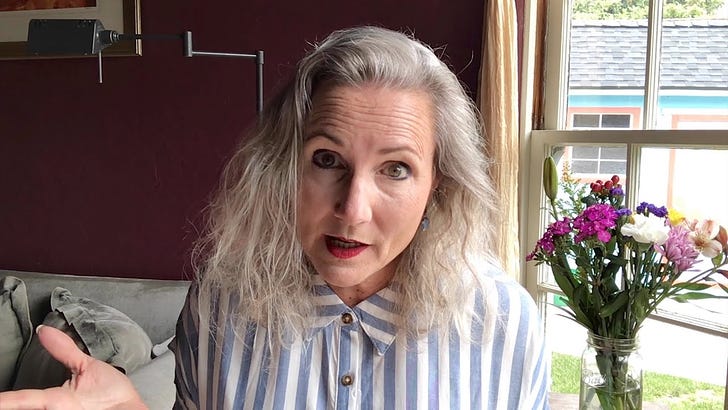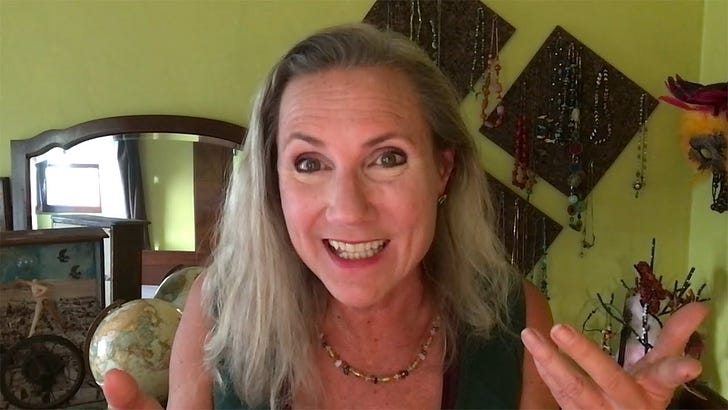The Intoxication of Power and Its Antidote
Simulation Commander and Screaming Into the Void
On his excellent Substack, Screaming Into the Void, Simulation Commander ended a recent post with: “As the man in my avatar [George Orwell] famously said:
I don’t think that’s true (and neither does SimComm). In fact, I believe that we’re moving into a time of detoxification, the tonic antidote to power over others. What we’re experiencing from those addicted to power is a desperate swarm of aggression, a last giddy head rush. The antidote to power over others is power over ourselves and only wanting that. It’s letting go of telling other people what to do. It’s letting go of our power over other people. It’s enabling people to take responsibility for themselves, and trusting that will come back to us.
This is hard because power over others—in the form of money—enables us to survive. We have what I call empire privilege, the ability to consume without producing. Charles Eisenstein writes about something similar in Notes on privilege:
I agree with Charles in principle but think that the word ‘privilege’ shouldn’t apply if we’ve been made dependent on it and our lives now revolve around monetizing our time, our talents, our bodies, our relationships. In the video, I talk about transactional relationships and whether those would still be there if I wasn’t a customer, a client, a person with money and assets.
SimComm’s latest series has been on AI:
In this piece, he writes about the impact of AI on him as a content creator, and how jobs and small businesses are getting squeezed out. My daughter works for an agency that hires content creators and it’s a gig economy that relies on rigged algorithms and some kind of bidding wars that determine whether an ad gets placement. Small companies no longer have the budget to outsource their marketing, or even advertise.
So employees turned into independent contractors turned into a gig economy turned into a hustle culture.
As people are trying to figure out how to make it, many writers are turning to Substack. Some, like Naomi Wolf, are scraping by on 2400 paying subs. We all need to find a way to make it through this transition but my hope is that it is a transition, and that we know what we want on the other side.
I mention a couple of ‘solutions’ that I don’t think work in the long run. One is buying local. Although this is a great thing to do, and exactly what the system in my book promotes, it doesn’t solve the problem under the current system.
In the multiplier effect, Michael Shuman states that 68% of the money paid for local purchases stays in circulation. But my book shows that 39% is extracted for some form of taxes, including 15% for Social Security. Another 27% goes to housing, returning to the bankers who created the problem. And at least 15% goes to insurances in what Michael Hudson calls the FIRE economy—Finance, Insurance, Real Estate. After these are extracted, $100 turns into $1.20 in three iterations of changing hands.
The other problematic solution is Universal Basic Income, to which I have two practical concerns. One is that the cost of living, particularly housing, is relative to how much money people have. So it would only raise the cost of living and go right back to the people we don’t want to support.
My second concern is that it depends on producer nations who need dollars, which is changing rapidly with BRICS alliances and alternative oil bourses and SWIFT systems. The countries considering UBI are consumer nations with a services labor force. We make money by swapping services but we don’t make products. If there’s nothing we’re trading, I don’t know what our UBI will buy.
One commenter, Timothy Staples, wrote:
Exactly.
And, the next logical step is the individual must be free to own all stores-of-value that the individual creates through his own effort and trade, so that there is enough production that human society can prosper over-all.
I replied:
What my book says is that all ways in which money results from labor should belong to the individual, and all ways in which money is made from money or resources should belong to the community: How to Dismantle an Empire.
I look at housing as the legacy of a community and mortgages as the intergenerational transfer of wealth. Like UBI, my system pre-distributes the mortgages and student loans as dividends but it only becomes income when you give it to someone else, in return for something they do for you. So it increases the productivity of the community with every exchange.
In our current economic system in the US, bankers issue and collect the money as mortgages. While the principal cancels itself out, the interest—which is the vast majority for most of the loan—goes to the bankers as profit even though they loaned none of their own money. Although 94% of all dollars are created through mortgages, the principal and interest pull 200% of the money created out of the economy over the life of a 30-yr loan at 5.3%. This is why banker capitalism is in crisis: there’s not enough money in circulation to repay the loans, and more can’t be generated by lowering the interest rate because the Fed funds rate was at zero or below.
The bankers pass the bonuses from one hand into their other hand as capitalists, where they or their intermediaries are on the Boards of multiple interlocked corporations. The dollars they conjured out of thin air have now been bluewashed, backed by the labor of everyone with a roof over their head. When they “invest” the bluewashed dollars, it spends the same as hard-earned money scraped into savings. This creates the illusion that they’re putting in a value they created, or a speculative value they ‘won’ fair and square.
Instead it’s like the archon who claims ownership of all the land and demands tribute in order to live on it. He creates 30 years of tribute with one wave of his wand, or click of his minion’s mouse, and lends it to the peasant to hand back to him in payment for the land. Since the tribute loan can only be paid back in this fiat currency, the serf or villein, as small landowners were tellingly called, needs to sell his labor or produce at whatever the archon will pay. However the sleight of hand in the bank puppet ‘giving’ the loan and the corporate puppet ‘giving’ the job disguises that the same entity is holding the properties hostage and then generously ‘allowing’ their servants to live in them, while they serve their interests.
The bank and corporation are seen as benefactors because they ‘give’ the person a loan or a job, not take their labor at gunpoint. Instead of forcing slaves or peasants to work, which is costly and ineffective, the masses compete with one another to pledge and surrender their labor. This competition is by demonstrating how many other people they can give the archon control over, by making them more money. The higher the salary, the more other people the employee has empowered the archon to enslave.
So the banker-capitalists are the real government, not the shadow government.
In response to my last episode, Gabriel of Libre Solutions Network posted:
After writing about 8 Red Flags on Orbital Blockchain, he wrote, “This entire post has partially been inspired by what appears to be the most important piece on substack at the moment:
Tereza, correctly points out that the goal of controlled opposition is to lead people back into the slaughterhouse. She gives many examples of signs to look out for. I am very distressed that the assault on the public during the covid years has gone essentially unpunished, causing serious harm to people of all walks of life. If there was ever a time to be seriously critical of one’s allies I can’t think of a better time. I’ve written before that “It’s not what you say but how you say it” and Tereza succeeds to be factual, firm, but not inflammatory. This is something I would love to learn from.
Thank you, Gabriel! And he continued:
I have serous problems with any technological approach that isn’t primarily centered on education, reform, and empowerment.
This was such a delight because I think technology is what we need in order to flesh out, imagine and play with our models of community economies, kludging modules for different functions that we can invent better, and testing them out. It could be a cooperative competition in community design, which would be so fun.
So thank you, Simulation Commander, for the thought-provoking articles and the heartwarming cat memes. And I hope we can continue this conversation of dreaming together the world we want to create, where no one is subjected to the gig economy of having to sell your soul in order to have a roof over your head.
To follow up, I recommend Five Feminine Economies on different models for different functions:
For Mother's Day, here are my hopes and dreams for five feminine economies. I develop a subsistence economy with neighborhoods involved with farming and animal husbandry. A reciprocal economy for local goods and services, as explained in my book, How to Dismantle an Empire. An edu-travel economy for a lifetime of learning around the world. A hosting economy with travel vouchers and sibling cities. And a gift economy for all things infinitely replicable like ideas, writing, music and open source software.
and for another fine thing to do that’s not a solution, here’s Questioning the Greater Reset:
A movement called The Greater Reset is gaining traction, based on a 1970 radical libertarian philosophy called Agorism. Its members aggregate in Freedom Cells and practice counter-economics, as explained by Derrick Broze in Manifesto of the Free Humans. I give my understanding of it and the people I admire, like Joel Salatin, RFKjr & James Corbett, who are part of it. But I also raise four concerns and ask the question: can you change the system by dropping out or can you only drop out by changing the system? I explain how my system differs and why I think it would make The Great Reset obsolete.








Michael Hudson is good on the economy but sadly fell for convid.
I was expecting him to see the big pharma scam, but he didn't.
Here's another good economic blog, https://charleshughsmith.blogspot.com/
"What we’re experiencing from those addicted to power is a desperate swarm of aggression, a last giddy head rush." Completely agree. Last gasps world.
Re: "As people are trying to figure out how to make it, many writers are turning to Substack. Some, like Naomi Wolf, are scraping by on 2400 paying subs."😹
As the pressure increases and the old system deconstructs, I'm trusting an ancient knowing that resides in all of us, comes into play, as we learn again how to live in, with and as nature, deepening our connections with each other. Transition will follow transition, will follow....etc. as we again pay attention to the 'core' stuff (often neglected) that doesn't change with change and speaks to something more 'real'.
I will listen to the vid while making breakfast in a bit. Thanks, Tereza. Happy Sunday!